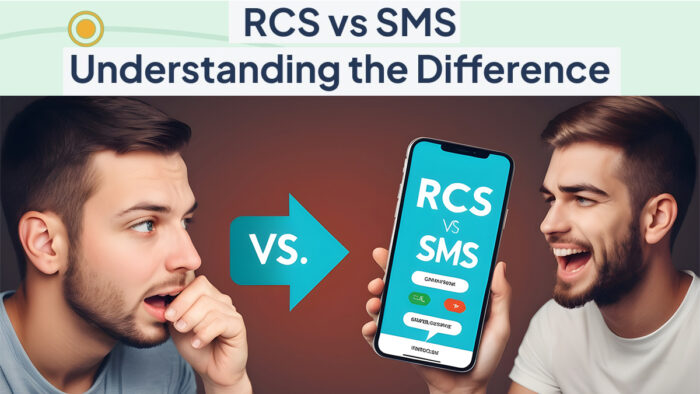Are you not sure whether RCS or SMS is the more incredible messaging protocol? Let’s clear up this confusion. In the world of communication, there is a need to connect and share information reliably, swiftly, and affordably.

When it comes to text messages, there are two protocols that often steal the spotlight: RCS and SM. However, these two are very different and offer their own unique benefits.
This article will give you an overview of these two and the key differences between them. By the end of this article, you will know the more beneficial option between RCS and SMS.
What is SMS?
SMS stands for Short Message Service, and it is the grandfather of text-based mobile communication. It enables users to send short text-only messages of about 160 characters from and to mobile devices. Since its inception in 1990, mobile communication has proven to be a reliable, efficient, and universal option for communication.
It has achieved a very high adoption rate globally. The reliability of SMS has made it the best choice for various businesses for customer service in their marketing activities. Users can easily engage and reply to messages in limited ways, such as by replying with a trigger word or short code.
What is RCS?
RCS stands for Rich Communication Service, and it is a protocol that is designed to replace SMS messages. It has a richer text message system that can provide phonebook polling, transmit in-call multimedia, and transmit different content. This also allows for about 8,000 characters in long messages.
RCS is often considered a more advanced successor to SMS. This is because it is capable of supporting read receipts, group chats, and multimedia contents. However, its adoption has been very slow for many reasons. This includes network limitations and a lack of universal devices and standards.
Specifically, Apple devices do not currently support this technology, despite Google’s public efforts to persuade the company to adopt the standard. Apple’s stance on the matter is that its iMessage offers comparable features to this technology. And there hasn’t been significant demand from customers for the integration. Moreover, Apple believes that adopting the technology could potentially impact its sales negatively.
RCS vs. SMS: Features and Characteristics
Let’s dive into the features and characteristics that make these two mobile communications different.
RCS
- It allows users to exchange longer messages.
- Messages are sent through WiFi or cellular data instead of a cellular network.
- Allows users to share multimedia content like videos, images, and GIFs within the messages.
- The messages contain interactive elements like suggested actions, buttons, and forms. This allows you to engage with different content within the message directly.
- Typing indicators and Read receipts.
- Group messages
- End-to-end encryption. This means no third parties can have access to the messages as they are forwarded from your phone to the one you are messaging.
SMS
- The message’s length is 160 characters.
- It is supported by virtually all mobile phones across the world. This includes both basic mobile phones and smartphones.
- Very affordable for both consumers and businesses.
- They only contain texts, so they don’t contain other types of media.
- Messages are sent through a cellular network instead of cellular data or WiFi.
In contrast to SMS, RCS offers extra features like read receipts, typing indicators, and sharing multimedia, enhancing communication between people. But SMS still holds an advantage for now because it works smoothly across different devices and networks, making it widely compatible.
Comparing RCS and SMS
Let’s check out three factors you should consider when choosing between these two options:
• Accessibility and use
SMS stands out for its widespread availability. It reaches nearly all mobile devices and provides businesses with a broad audience reach.
In contrast, RCS, while offering advanced features, faces great limitations. It demands newer devices and recent software versions, thereby reducing its accessibility. Moreover, even on compatible devices, users must activate it manually, causing a disjointed user experience.
• Dependability and safety
SMS boasts a solid reliability history, performing incredibly well even in challenging network situations to make sure that the message delivers.
Conversely, RCS relies on data connections, making it prone to disruptions in areas with very weak data signals, affecting its reliability and accuracy.
Regarding security, you should know that they both have their risks. However, RCS, being more intricate, presents more potential points of attack. Nonetheless, it offers end-to-end encryption, providing an edge over SMS in safeguarding privacy.
• Cost and complexity
Although RCS offers users more features, implementing them can be very expensive and complex. This can discourage businesses, especially small ones or those with small budgets, from opting for RCS.
In contrast, SMS offers a very easy and affordable option. Often included in mobile plans at no extra cost. SMS is easy to use and integrates seamlessly, keeping costs down for small and large businesses.
Top of Form
RCS vs. SMS: What’s the difference?
The main difference between RCS and SMS is exclusivity. RCS is a chat protocol that was designed to replace SMS, and it offers similar features to Apple iMessage. Although it does not come pre-installed on all Android devices, you may have to manually add it. Here is the key difference between these two:
| RCS | SMS | |
| Character limit | It supports longer messages | Only 160 characters |
| Security | End to End Encrypted | Vulnerable to spoofing and interception |
| Adoption | It Varies by carrier and region | Across the world |
| Cost | This varies by the data usage for multimedia | Affordable, standard messaging rate apply |
| Delivery receipts | Yes | No |
| Tying indicators | Yes | No |
| Sent via | Internet (cellular data or WiFi) | Cellular network |
| Format | Multimedia and Text | Text only |
| Compatibility | Android phones only | All mobile phones |
Choosing the best communication protocol is very important for your business. However, there is absolutely no direct answer to whether RCS or SMS is the better choice for your business.
The two mobile communication methods have their own pros and cons. So, the best one for your brand will depend on certain factors, like your target audience, marketing goals, and budget.



